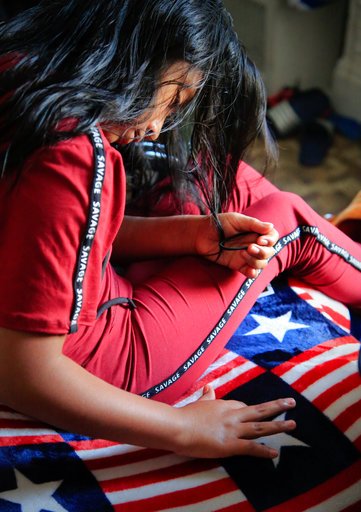NEW YORK -- U.S. District Judge Dana Sabraw said he's pleased with the progress President Donald Trump's administration is making toward meeting a Thursday deadline to reunite more than 2,500 children with their families after they were separated at the border.
"I am very impressed with the effort that's being made. It does appear there's been great progress," Sabraw told attorneys for the U.S. Justice Department and the American Civil Liberties Union. "At least for those class members who are eligible and easy to reunify, this is very promising."
Justice Department attorneys said Friday that 450 children 5 and older had been reunited, up from 364 a day earlier.
There are still hundreds to go. In a court filing Thursday, the administration said about 1,600 were believed "eligible" and about 900 were "not eligible or not yet known to be eligible."
Meanwhile, migrant parents who were separated from their children under the administration's zero-tolerance policy are struggling to communicate by any means possible with sons and daughters kept in government-contracted facilities around the country.
Carla Garcia, from Honduras, waits each day in Baton Rouge on calls for unscheduled telephone and video conversations with her son at a holding facility in Texas -- calls she cannot return. She and 5-year-old Jonathan were separated after crossing the border together in late May. Garcia was released from detention a month later with an ankle monitor and moved in with relatives.
[U.S. immigration: Data visualization of selected immigration statistics, U.S. border map]
"I was happy to be able to see him, and then it was even more difficult to see him from far away," she said. "He just looked at me, worried."
Several parents say it has been difficult or impossible to maintain their composure as children break down in tears, complain of loneliness, ask for clues about when they might be released or think they were abandoned.
"She was crying, inconsolably," said Josue Aguilar, a Guatemalan, about his 16-year-old daughter, who he believes is at a holding facility somewhere in Texas. "She said, 'I don't want to be here anymore.' I could only tell her to try and have a little patience."
In other cases, parents and children are finding creative ways to cope. A 15-year-old boy told his 5-year-old brother that their separated mom was working and that's the reason they're apart, said the lawyer for the mother.
Adrian Velasquez persuaded a social worker to text him three pictures of his 8-year-old son. The images show Jason doing math homework inside a government facility in Texas and standing alongside smiling children of his age.
Velasquez said his son initially threatened to break free and escape his location after they separated by authorities at the Texas border. A month later, he believes the boy has adapted and will eventually be freed without signs of emotional trauma.
"He is a really active kid," Velasquez said. "It's not going to affect him."
In rare instances, parents have been allowed to visit face-to-face with their children under supervision, as authorities take weeks to complete background checks and custody paperwork.
Asylum seeker and mother Digna Perez of El Salvador said the arrangement was stifling and upsetting.
"They didn't feel free to talk to me that way -- not as if I were alone with them," said Perez of her 9-year-old son and 6-year-old daughter. She was separated from them in late May as they crossed from Mexico into El Paso, Texas. "They're always going to have this memory when they're older. They're not going to forget this easily, the separation."
Mario Romero of Honduras recalled an hourlong visit with his 10-year-old daughter, Fabiola, at the office of a child-detention contractor in El Paso -- a few blocks from the border with Mexico.
"I could see her, I could hug her," Romero said. "Thank God I was given the opportunity to kiss her."
Perez and Romero were reunited with their children on Monday.
Separately, federal public defenders say asylum seekers are enduring horrible conditions in a U.S. prison in Oregon, apparently driving at least one person to attempt suicide.
They say about 120 people are crammed into filthy, tiny cells with open toilets and are given scant meals that leave them hungry.
Leland Baxter-Neal of the American Civil Liberties Union of Oregon said Friday that human suffering has resulted from the Trump administration's decision to lock up asylum seekers in the prison in Sheridan, Ore.
Federal Public Defender Lisa Hay said in a letter to the prison warden and a senior official of Immigration and Customs Enforcement that they learned of an apparent suicide attempt by a detainee.
William Teesdale, chief investigator for the federal public defender in Oregon, said detainees are triple-bunked in cells and strip-searched in front of other detainees.
An Immigration and Customs Enforcement spokesman said the agency is unable to comment due to pending litigation.
Information for this article was contributed by Andrew Selsky of The Associated Press; and by Kartikay Mehrotra of Bloomberg News.
A Section on 07/21/2018
